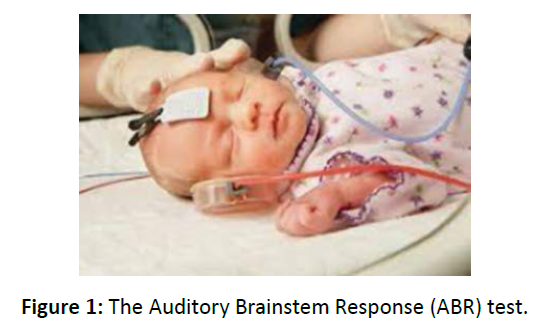Image Article - Otolaryngology Online Journal (2021) Volume 11, Issue 7
Auditory Brainstem Response Test
Feroz Shaik*
Department of otolaryngology, Augusta University, 1120 15th St, Augusta, GA 30912, USA
- *Corresponding Author:
- Feroz Shaik
Department of otolaryngology, Augusta University, 1120 15th St, Augusta, GA 30912, USA
Accepted: July 28, 2021
The Auditory Brainstem Response (ABR) test may be a helpful tool in determining a child’s ability to listen to. The test uses a special computer to live the way the child’s hearing nerve responds to different sounds.
Three to four small stickers called "electrodes" are going to be placed on your child’s head and ahead of his or her ears and connected to a computer. As sounds are made through the earphones, -the electrodes measure how your child’s hearing nerves answer them (Figure 1).
The audiologist, or hearing specialist, looks surely neurological "markers" as your child’s hearing nerves answer sounds (Figure 1). The softest intensity or loudness level at which these markers appear roughly corresponds to the child’s hearing level therein frequency range or pitch. By reading a computer printout of your child’s responses and interpreting these markers, the audiologist can tell if your child features a hearing problem.
• The ABR test measures the reaction of the parts of a child’s systema nervosum that affect hearing. (The ABR test measures the hearing nerve’s response to sounds).
• An ABR test is usually ordered if a newborn fails the hearing screening test given within the hospital shortly after birth or for older children if there's a suspicion of deafness that wasn't confirmed through more conventional hearing tests.
• The ABR test are often completed as long as the kid is sleeping or lying perfectly still, relaxed and together with his or her eyes closed.
• If your child is older than 7 years, the ABR test usually are often done while your child is awake if he or she will relax and lie still. The test is going to be wiped out a special sound-treated suite within the Audiology department.
• For children between the ages of 6 months and seven years, the ABR test is completed under anesthesia, which suggests that your child will need medication to assist him or her sleep throughout the test. ABR tests with anesthesia are done through an equivalent Day Surgery Center.
• When anesthesia is required, there are special rules for eating and drinking that has got to be followed within the hours before the test. If these rules aren't followed, the test can't be done that day.
